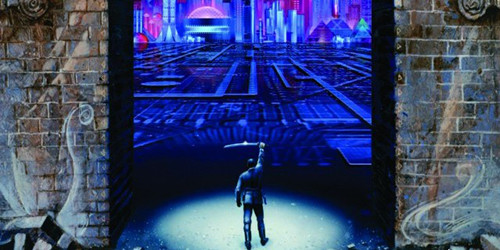Excerpt from the novel Snow Crash ![]()
![]() by Neal Stephenson
by Neal Stephenson ![]()
![]()
The house is sort of a medernist castle with a high turret on one end. Da5id and Hiro and the rest of the hackers used to go up there with a case of beer and a hibachi and just spend a whole night, eating jumbo shrimp and crab legs and oysters and washing them down with beer. Now it’s deserted, of course, just the hibachi, which is rusted and almost buried in gray ash, like an archaeological relic. Hiro has pinched one of Da5id’s beers from the fridge, and he sits up here for a while, in what used to be his favorite place, drinking his beer slowly, like he used to, reading stories in the lights.
The old central neighborhoods are packed in tight below an eternal, organic haze. In other cities, you breathe industrial contaminants, but in L.A., you breathe amino acids. The hazy sprawl is ringed and netted with glowing lines, like hot wires in a toaster. At the outlet of the canyon, it comes close enough that the light sharpens and breaks up into the stars, arches, glowing letters. Streams of red and white corpuscles throb down highways to the fuzzy logic of intelligent traffic lights. Farther away, spreading across the basin, a million sprightly logos smear into solid arcs, like geometric points merging into curves. To either side of the franchise ghettos, the loglo dwindles across a few shallow layers of development and into a surrounding dimness that is burst here and there by the blaze of a security spotlight in someone’s backyard.
The franchise and the virus work on the same principle: what thrives in one place will thrive in another. You just have to find a sufficiently virulent business plan, condense it into a three-ring binder—its DNA—xerox it, and embed it in the fertile lining of a well-traveled highway, preferably one with a left-turn lane. Then the growth will expand until it runs up against its property lines.
In olden times, you’d wander down to Mom’s Cafe for a bite to eat and a cup of joe, and you would feel right at home. It worked just fine if you never left your hometown. But if you went to the next town over, everyone would look up and stare at you when you came in the door, and the Blue Plate Special would be something you didn’t recognize. If you did enough traveling, you’d never feel at home anywhere.
But when a businessman from New Jersey goes to Dubuque, he knows he can walk into a McDonald’s and no one will stare at him. He can order without having to look at the menu, and the food will always taste the same. McDonald’s is Home, condensed into a three-ring binder and xeroxed. “No surprises” is the motto of the franchise ghetto, its Good Housekeeping seal, subliminally blazoned on every sign and logo that make up the curves and grids of light that outline the Basin.
The people of America, who live in the world’s most surprising and terrible country, take comfort in that motto. Follow the loglo outward, to where the growth is enfolded into the valleys and the canyons, and you find the land of the refugees. They have fled from the true America, the America of atomic bombs, scalpings, hip-hop, chaos theory, cement overshoes, snake handlers, spree killers, space walks, buffalo jumps, drive-bys, cruise missiles, Sherman’s March, gridlock, motorcycle gangs, and bungee jumping. They have parallel-parked their bimbo boxes in identical computer-designed Burbclave street patterns and secreted themselves in symmetrical sheetrock shitholes with vinyl floors and ill-fitting woodwork and no sidewalks, vast house farms out in the loglo wilderness, a culture medium for a medium culture.
The only ones left in the city are street people, feeding off debris; immigrants, thrown out like shrapnel from the destruction of the Asian powers; young bohos; and the technomedia priesthood of Mr. Lee’s Greater Hong Kong. Young smart people like Da5id and Hiro, who take the risk of living in the city because they like stimulation and they know they can handle it.


